#literary study
Text
"Turn over the leef and cheese another tale."
The Canterbury Tales (c.1387-1400), Geoffrey Chaucer
from The Literature Book: Big Ideas Simply Explained, James Canton
leave a little kindness
#juli-quotes#juli-the-literature-book#the literature book#big ideas simply explained#james canton#the canterbury tales#canterbury#canterbury tales#geofrey chaucer#chaucer#english literature#literature#history of literature#literary devices#literary study#classic#classics#classical#classic literature#life#life quotes#academia#dark academia#light academia#literature studyblr#literature student
17 notes
·
View notes
Text
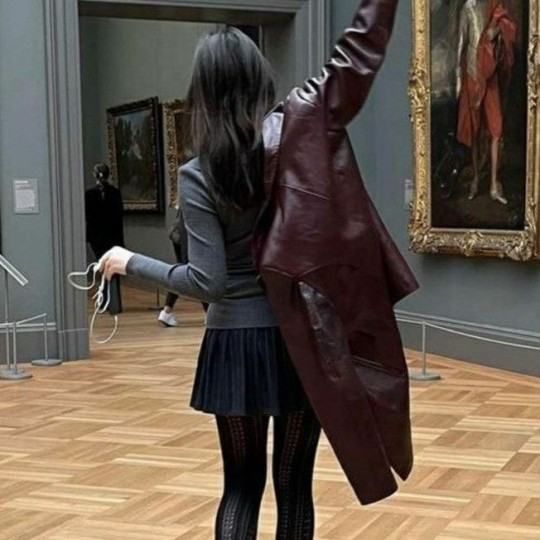




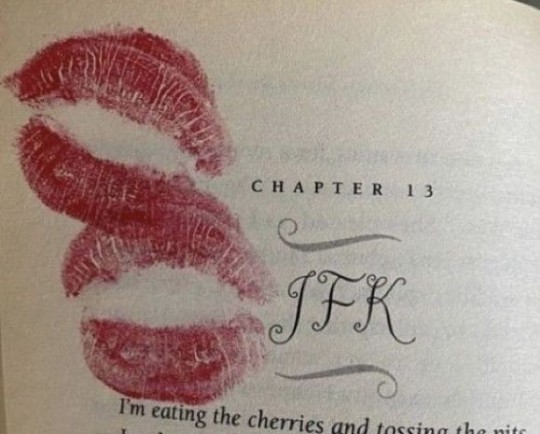


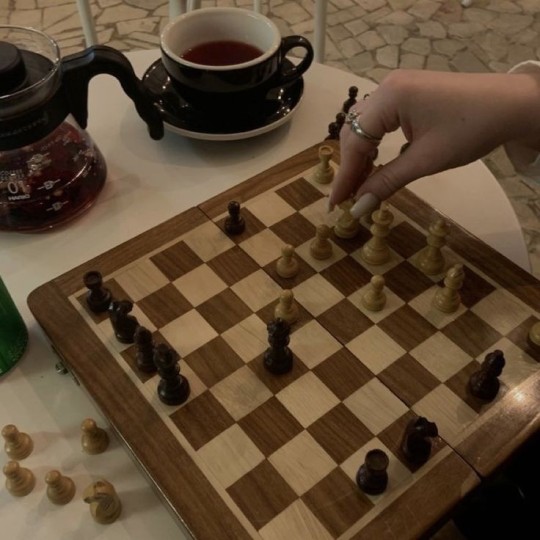
weak and weary
#aesthetic#dark academia#coffee#art#books#academia#college#light academia#studyblr#literature#dark acadamia aesthetic#dark acadamia quotes#dark academia moodboard#Pinterest#Study#edgar allan poe#classic literature#english language#literary quotes#Quotes#Writing#Writersblr#light acadamia aesthetic#light academia moodboard#chaotic academia
2K notes
·
View notes
Text

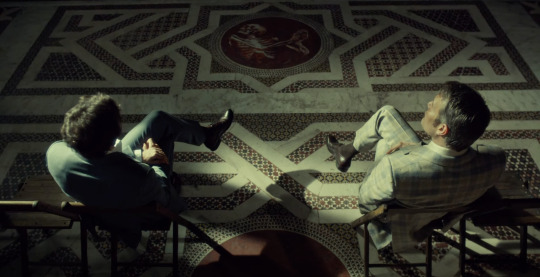


Claudia Durastanti, Strangers I Know / NBC’s Hannibal (2013-2015)
"Every crime of yours feels like one I am guilty of. Not just Abigail's murder, every murder stretching backward and forward in time. Freeing yourself from me and me freeing myself from you, they are the same. We're conjoined."
#pluto dont make every piece of media you consume about hannibal challenge failed#reading this book for my literary studies course#couldnt stop thinking abt these excerpts#pluto web weaves#nbc hannibal#hannibal lecter#hannibal#will graham#the wrath of the lamb#hannigram#hannibaledit#claudia durastanti#strangers i know
1K notes
·
View notes
Text
Literature is the window to the soul.
#dark academia#light academia#classic literature#literature#booklr#cottagecore aesthetic#halloween#dark academia aesthetic#cottagecore#the secret history#dark literature#literary#booktok#autumn#academic#study aesthetic#american literature#studyblr#light academia aesthetic
1K notes
·
View notes
Note
was thinking about this earlier but the dynamic of cannibalism being associated with high society and the culinary elite (hannibal comes to mind specifically) while also simultaneously being associated with the socially isolated and economically impoverished (as in texas chainsaw massacre) is so interesting to me i want to read 10 million books on why it happens so much in media....
i can only speak from a place of personal opinion and general knowledge, because i haven't read that many papers or in-depth studies on cannibalism, but i think it often comes down to an interesection between the themes of the story you're telling and class structures and divisions. cannibalism is a compelling form of narrative symbolism because it's undeniably impactful and hard to ignore. when portrayed as a practice associated with the culinary and social upper class, it might be used as a critique of the rich and powerful and their lack of ethics and willingness to consume and destroy others for their own self-interest by showing them literally preying on and consuming their victims, or a horror story/cautionary tale about how having everything can lead you to never be satisfied and turn to increasingly extreme measures to feel like life is worth living, or a dark fantasy of indulgence and excess. when associated with the poor, marginalized and isolated, it's often based in bigotry and harmful stereotypes of the "primitive" "inhuman" "savage" "other", however it might also function as a revenge fantasy where the most oppressed and exploited members of society turn on their oppressors and take "eating the rich" to its most literal extreme, exposing the fragility of class divisions and pointing out that those in positions of social and economic power are hardly the mythic titans their propaganda tries to make them out to be, but ultimately just as mortal and made of flesh and blood as any other human being, and not immune to being dragged down from their position at the top of the food chain and torn to pieces by the crowd (as well as reminding the audience of their own fragile mortality and precarious position in the social order, and the humanity we all share in common - however cannibalism often divides the perpetrators from both their victims and the audience, so this is rarer than the other interpretations mentioned).
cannibalism and power often go hand in hand. cannibalism has historically been used as both a means of displaying your power over defeated opponents and delivering a final, humiliating blow to their image by consuming their flesh, and a means of othering and dehumanizing your opponent by portraying them as the cannibalistic monster.
both the very rich and very poor also tend to be perceived as more distant from the people who make and consume these stories, making them easier to project fiction onto and transform into symbols and narrative devices (or, in the worst cases, dehumanize) than those who occupy the same social spheres as the creator. they can be held at an arm's length without discomfort and, depending on the target audience, may be a source of fascination due to the differences in their lived experiences. it adds to the fantasy, and makes any inaccuracies, exaggerations and fabrications feel more plausible because the majority of the audience probably don't have any personal experiences of being in those positions to draw on.
#cannibalism#classism#like this is literally just my interpretation based on my knowledge of media studies literary analysis and sociology#i cant say with any certainty whether its a True and Accurate assessment
2K notes
·
View notes
Text
yall i just KEEP doing back to mizu and taigen's wrestling scene in master eiji's forge and like i know that taigen literally got a boner from it BUT THE THING IS out of all the scenes these two have together, this scene actually has the least sexual tension ?!? cuz like the boner aside, this scene is actually very soft and emotions-driven rather than pure passion or lust.
arguably, a more passionate and sexually-charged scene would be their previous brawl in the snow with the chopsticks, which is tense and angry and also the scene that mizu thinks about when madame kaji talks about being honest with one's innermost desires.
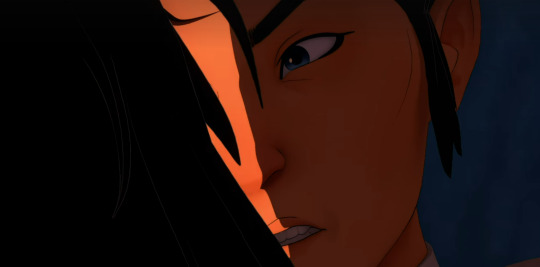

but THIS scene in the forge? warm colours. their laughter and their smiles that both equally genuine. the WAY taigen looks at mizu in that scene, staring first at her lips, her smile, then looking into her eyes. and you can see by the framing of the scene and the look on his face that he is, for the first time, seeing her eyes as something beautiful rather than off-putting or frightening.
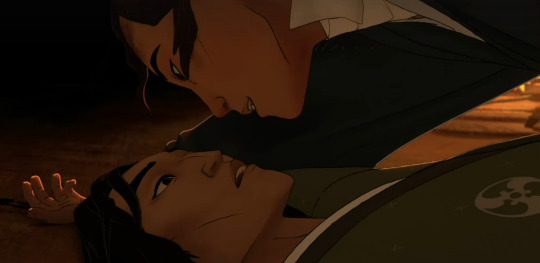
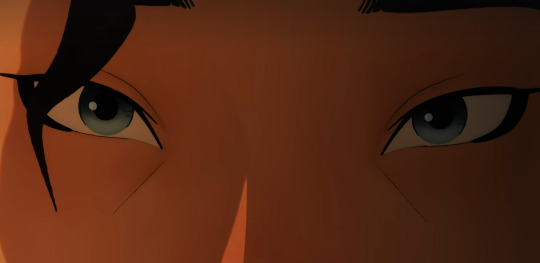
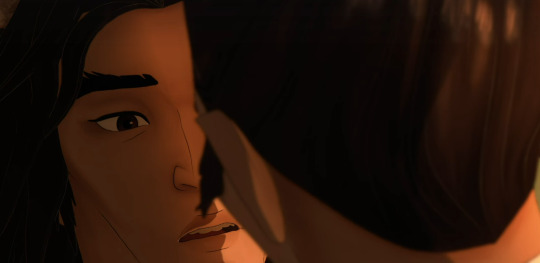
like before this point he's already come to not only respect mizu as a person and an equal but also admires her as an incredible swordsman and as someone who is kind and honourable* for having saved his life at the expense of her revenge quest. so as of the time of them tussling in the forge, taigen has already put aside his prejudices about mizu's blue eyes and no longer finds them as any cause for disgust. but in this scene he's not just indifferent about her eyes, but attracted too it.
and i'd also like to argue that his boner is not from the physical exertion or the act of wrestling itself, but from the intimacy of a playful spar, enjoying each other's easy company after having established a deep trust with each other (taigen endured torture for mizu and helped defend her from archers in the chasm while mizu saved his life from fowler's castle)
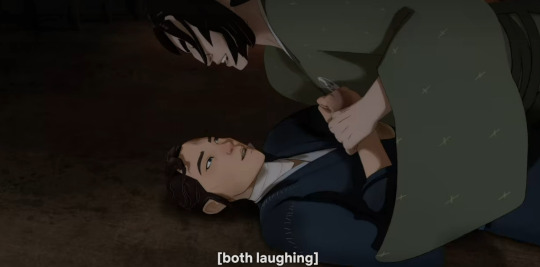
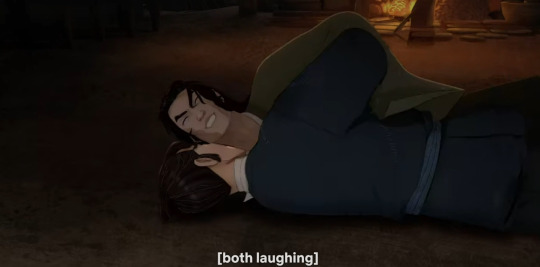
and all this while in the safety of mizu's childhood home while both of them are still recovering from near-death, amplifying their vulnerability with each other.

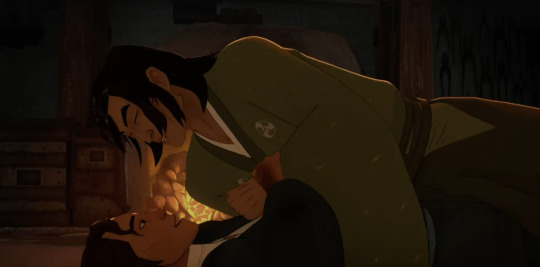

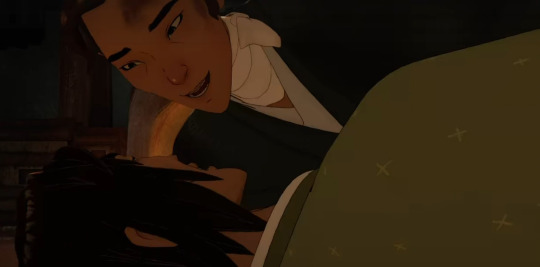
like when was the last time mizu cracked a genuine smile, let alone a laugh that's more than a little wry chuckle?? and for this to happen at such a low point in her life also speaks to the comfort this little friendly spar gives her.
because like, this is after she failed her mission to kill fowler. meanwhile her sword--the embodiment of her soul--is broken, and ringo who is her closest confidant is now angry at her and barely even looks at her. it just further lends to the inherent tenderness and intimacy in this scene. and i just. AHHHH i love them your honour....
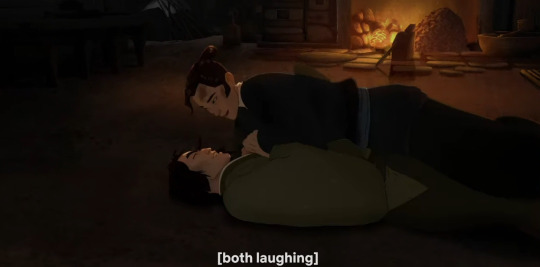
* ALSO as a side note about taigen believing mizu to be honourable: he later realises that this assumption turns out to be quite false when she reveals that she'd not only allowed akemi to be taken away against her will but also has said nothing about fowler's impending attack on edo.
also i find it very interesting that out of the two revelations, taigen is less angered by mizu letting akemi being married off (he sighs angrily and marches off saying he has to go to edo to find akemi), but much more angered by mizu's refusal to save the shogun and the shogunate as a whole.
this is more proof that taigen's central principles are firmly rooted in the bushido and the concept of honour that comes with that. it's why he lashes out at mizu. because he'd believed mizu to be honourable and righteous, but was proven wrong. that's not to say that taigen is in the right for calling mizu a demon, not by any means. but i just find it a very interesting part of his character and it relates to his relationship and perception of mizu
also while rewatching the episode i found this very funny they just lyin there in the cart like this 🧍🏽♂️🧍🏽♂️
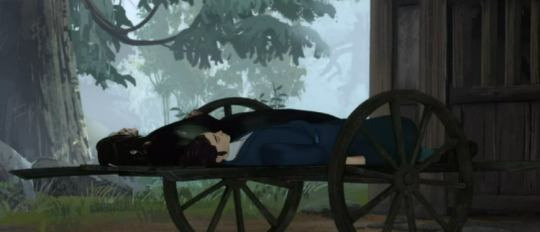
#blue eye samurai#mizu x taigen#taimizu#taizu#taigen blue eye samurai#mizu blue eye samurai#blue eye samurai meta#sorry yall but i prefer taimizu as the ship name so i'll probably just be using that from now on 🫡#also like.. the way im still recovering from covid while i have 2 deadlines back to back tomorrow and the day after#but im too busy hyperfixating on this show!!!!#if only i could channel all this energy into my actual literary studies papers that'd be great#but at the moment i be caring more about these fuckers than whatever william blake's got going on#jk i do still love william blake's poetry but my stupid ships take up way more space in my brain ykwim 🤒#anyway...#shut up haydar#meta dissertations.pdf#fandom.rtf
712 notes
·
View notes
Text
jonathan harker when he is given terrible omens, driven round in circles for hours, meets the weirdest guy on earth, is isolated in a creepy castle: well this is odd :/
jonathan harker when his shaving glass is thrown out the window: i am a prisoner!! i have been trapped i am like a wild animal!!! how will i be able to shave?? through the reflection on my pot or watch case???? oh my prison guard is SOULLESS and i am DISTROUGHT
#dracula daily#dracula#jonathan harker#and then two sentences later he’s like ‘but the view is so beautiful i am normal now :)’#anyway i could do legitimate literary analysis on dracula if anyone wants to see that at some point#i studied this book for class and it’s legitimately fucking crazy#even just something silly like this could be Saying Something
19K notes
·
View notes
Text
I've been doing a lot of reading lately about the history of vampires in fiction and how the vampire as we know it today first entered literature, and the subject is honestly fascinating. The traditional folklore around vampires and vampire-like creatures is largely very different from what we'd think of as a vampire today, and it's also very different from how vampires appeared in even their earliest literary incarnations.
For one thing, there's nothing particularly alluring about most traditional vampires. They're bloated corpses that have crawled out of their graves, not dashing mysterious counts in lonely castles. They're not a particularly stylish or sexy monster.
However, from pretty much the moment that western literature first turned to the vampire myth for inspiration, writers saw something in the concept to sexualize. The poem "Der Vampir" (The Vampire) by Heinrich August Ossenfelder is often cited as the first ever true literary depiction of a vampire (published 1748!), and it is about a man corrupting a chaste and religious woman through his unwanted kiss/vampiric bite. John William Polidori's 1819 short story "The Vampyre" is widely seen as the first work to truly codify vampire fiction, and the titular Vampyre Ruthven is in large part inspired by the womanizing Lord Byron. Le Fanu's Carmilla depicts an intense attraction between Carmilla and her victim Laura. Stoker's Count Dracula is a man with overly flushed lips and hair on his palms, marks of Victorian fears of sexuality.
From the very start, vampires in literature have been a sexual monster. They're emblems of the seductive and terrible—the kiss of death that you can't help but be drawn to anyway. A violent forced intimacy that will corrupt you and drain away your very life force. There's a great deal of xenophobia and fear of the un-christian in early vampire fiction as well, but the fear of sex and sexual assault have always been a driver of literary vampires' horror and allure. Writers seem eternally split between desire for the vampire and revulsion at that very lust, even from the moments that the creatures first graced the page.
There's a great tradition of vampiric fiction both using vampirism to evoke sexual predators and making vampires themselves desirably sexy. Thus, given that it is very concerned with sexual assault and bodily autonomy as themes, often uses predation by a vampire to evoke sexual violence, and is deeply horny about vampires and blood drinking, Jun Mochizuki's The Case Study of Vanitas is actually one of if not the best modern successor to the canon of early vampire literature. In this essay, I will
#rare vnc post on main bc starting off with my obvious vnc icon and url would spoil the punchline#wanna take y'all by surprise a little ;P#anyway this post is a joke but the point I'm making genuinely kinda isn't#you know how it is#I am genuinely fascinated by the ways that vnc is in conversation with the literary sources that it pulls from#it really is riffing on a LOT of the same ideas through a modern lens#vnc#vanitas no carte#the case study of vanitas#invasion of the frogs
444 notes
·
View notes
Text
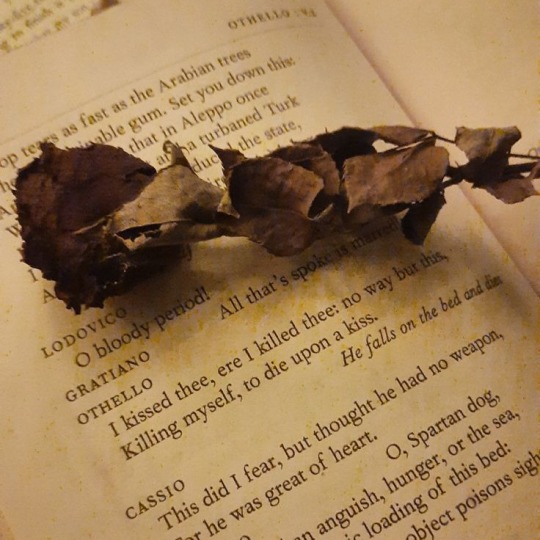
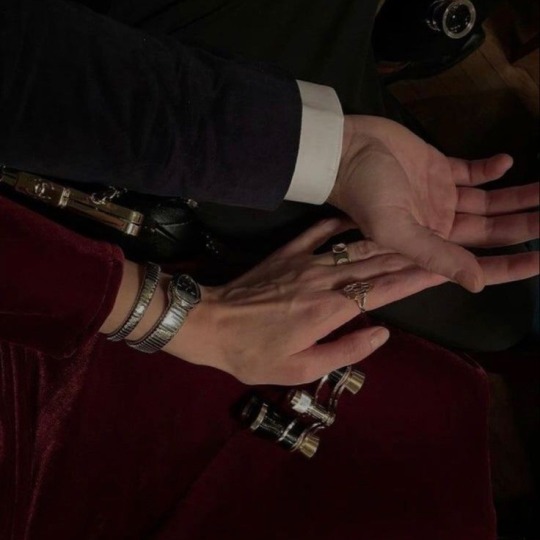


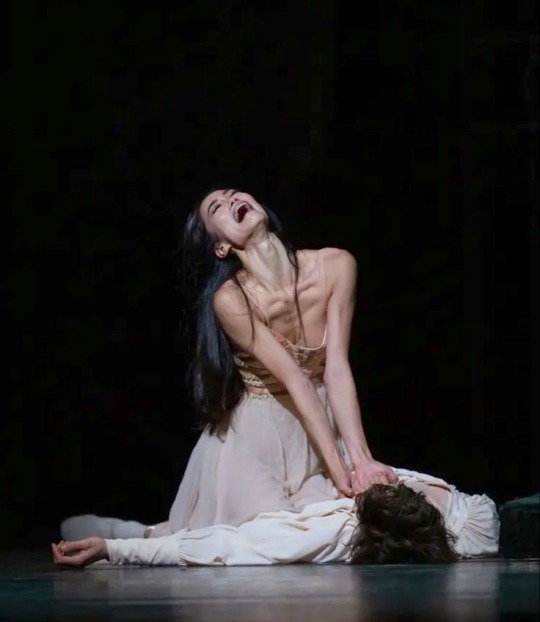



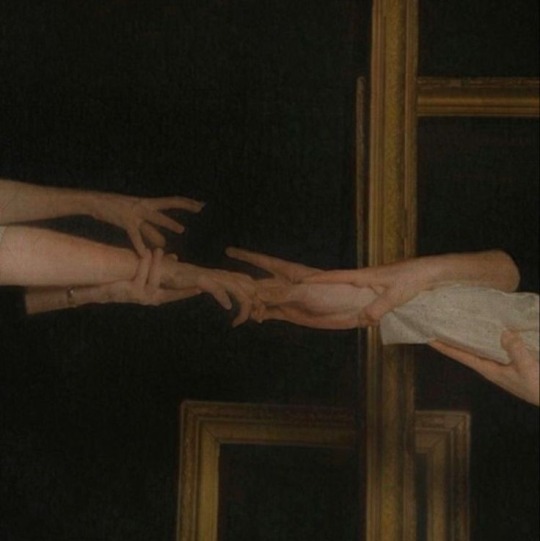
moodboard: theatre student
#theatre#theatre academia#dark academia aesthetic#dark academia#dark aesthetic#booklr#books#ballet aesthetic#theatre kid#light academia aesthetic#light academia#literature academia#literature#study motivation#studyblr#study aesthetic#uni student#chaotic academia#literary quotes#quotes#moodboard#current mood#source: pinterest#pinterest#studying#classic academia#romantic academia#romanticism
301 notes
·
View notes
Text
Okay, so – a few thoughts on Izzy’s death. I’m sure other people have also laid this out, but I haven’t stumbled across it yet, so this is partially for me to get my thoughts organized. For the record, I love Izzy – he fascinated me (in a horrified sort of way) in season 1, and then he grew on me significantly in season 2. What a weird little guy. But also – I’m fine with them killing him off, and also with how they did it, because I think it makes sense for the story. But I know that a lot of people are super upset about his death, and also about the way he died. So, a few semi-coherent thoughts on that:
Why not a sacrifice play?
This writer’s room is so self-aware, so deliberate about engaging with tropes – there is no possible way that they sat around breaking the story of Izzy’s death and no one said “woah, wouldn’t it be symbolic and gut-wrenching if he sacrificed himself for Ed? Or Stede?” No way. So why didn’t they go that route?
Izzy’s arc in season 2 has been all about becoming his own man, separate from Ed/Blackbeard. Like – that’s what he’s worked towards, this whole season. That is his growth. It would be insulting to take that away from him at the last minute, and make his death purely about Ed and Stede.
Listen, I love a sacrifice arc as much as the next person. But Izzy’s life isn’t about sacrifice anymore – that’s the whole point of his season 2 arc. He has spent decades sacrificing both himself and Ed to the altar of Blackbeard. No more.
It also means that Ed and Stede’s mourning doesn’t have to be tinged with the guilt of “he sacrificed himself to save me/my partner.” They can mourn Izzy purely for himself, because he is worth mourning. This, I would argue, is the send-off that Izzy’s character deserves.
Izzy’s death wasn’t accidental on Ricky’s part – it wasn’t a stray bullet.
We see from the scene when the crew is locked up in Spanish Jackie’s that Ricky recognizes Izzy. We know from their conversation that, for Ricky, Izzy is the epitome of piracy – Izzy, not Blackbeard, is the legend.
The thing is – Ed and Stede are both in the scene where Izzy dies (I’m not sure if you can see Stede on screen, but the bts photos show Rhys’ position, on what would be the far right of the shot). Arguably, Stede would have been the easier shot – Ricky wouldn’t have had to complete a full 180-degree turn before he could pull the trigger. So why doesn’t he go for Stede, who abandoned him to the tender mercies of Spanish Jackie in the first place? Or Blackbeard, arguably the greatest/most famous pirate alive, with the possible exception of Zheng, who he’s already targeted? Sure, you could argue that he’d going for Ed here… but I don’t think he is. The shot’s too low to be accidentally aimed for Izzy – it would hit Ed’s knee or something, probably. I think that yes, it’s a panicked shot, not well-aimed at all. But if it’s aimed at anyone, I think it has to be Izzy. And at the very least, the symbolism of it is very much not accidental.
For probably the first time since they created Blackbeard, Izzy isn’t just a stand-in for Ed. His significance is his own in this scene – in all of his interactions with Ricky. He’s not targeted because he’s Blackbeard’s first mate (why go for the first mate when you could go for Blackbeard?). He’s targeted because he’s Izzy Hands – because he is significant, powerful, famous, respected in and of himself.
And more than that – this is an arc about the end of piracy. And Izzy Hands is piracy – the show has been telling us from the beginning that piracy is a mixed bag, full of the good and the bad, and Izzy represents that – represents both the toxic, violent side of piracy, and the side of piracy that he grows into, that he explains to Ricky – piracy as family, home, belonging. Izzy dies, and it hurts, because not only is he a great character, but he represents in one person all of the complicated, hilarious, heartbreakin, violent, loving aspects of piracy – and of the show. But it is so, so important that Izzy dies as himself – not as a symbol or shield of Ed, or Stede, or Blackbeard. Not even as a symbol of piracy, but instead as the active embodiment of piracy – as something/someone who grows, changes, ends. Not as static or passive, but as better than when we first met him, as transformed as Buttons in his own way.
Izzy’s death sets up a possible revenge arc:
We know that everything in this show ties back to the main relationship between Ed and Stede. Izzy’s death is, I think, significant on its own, for him as a character – but it is also, by necessity, significant to Ed and Stede’s relationship. Namely – it sets up an interesting conflict for season 3 re: a potential revenge arc for Ed.
Now, clearly they’ve carefully ended season 2 on a relatively high note in case we don’t get a season 3. But we know they’re gonna be terrible at running an inn, and we know there’s unfinished business with Ricky. Ed’s current strategy of dealing with everything that’s happened seems to be “I don’t want to be a pirate, get me out of here” – which, while fair enough, won’t last, because that’s the nature of unfinished business. So, at some point, Ed and Stede are going to need to confront Ricky again. And, if the writers decide to lean into the revenge arc, I’d say the odds are pretty high that, when Ed lays eyes on Ricky again, we get a flashback to Izzy’s death.
And this sets us up for a pivotal, and necessary, moment in Ed’s character arc: when confronted with pain, loss, negative emotion in general – can Ed deal with it without losing himself? Ed needs a balance between the Kraken, Blackbeard, and Edward, and we see at the end of season 1 and beginning of season 2 how challenging that balance is for him to find, especially when confronted with loss or pain. We can see Ed working towards that balance when he’s interacting with Low – Low’s taunts don’t push Ed to violence, but instead get to Stede. But comparatively, Izzy’s loss is a much greater blow, and at some point, Ed is going to need to confront that.
Plus – we know the writing team are thinking of Izzy’s death at least partially in terms of the mentor/mentee arc, which often confronts the question of revenge – after the mentor’s death, the mentee is required to choose on their own how to go on, what kind of person they want to be. And this often requires a confrontation with both the mentor’s loss and a decision about how far they want to take their desire for revenge.
Why not a cooler death?
Okay — I get this criticism. I do. Izzy is an amazing fighter, we all love that about him. And you can keep most of the above symbolism and still have him die fighting two dozen British soldiers.
But — again — we are back to the root of this show: Ed and Stede.
Izzy has two deaths this season: one in the premiere, one in the finale. The first is Stede’s fantasy. Cool swordfight, and Stede triumphs, obviously — but the premise of the fight is that Izzy’s a great swordsman and Stede bests him because now Stede’s a great pirate. This is Stede’s ideal pirate fantasy.
But Izzy’s actual death is not like this. It is messy and inelegant and painful and no one gets any glory from it at all and Ed is crying with Izzy dying in his arms, and Stede wants to help, goes for bandages, but he doesn’t know what to do and it’s not enough anyways — And this is not a fantasy anymore. This is piracy, and this is the piracy that Ed wants to escape. And it’s important that Stede sees this, sees what Ed is done with.
And it’s also important that Stede tries to save Izzy. Izzy isn’t just a symbolic barrier between Stede and Ed anymore, to be sacrificed to Stede’s reunion fantasy. He’s his own person, with his own death, and Izzy has grown, yes, but so has Stede.
And by using Izzy’s death to make this point, we both get Stede learning the reality of piracy and growing beyond his fantasy, and the glorious fantasy fight kiss i love you reunion between Ed and Stede (if Ed and Stede had reunited by fighting off dozens of British soldiers, but Izzy had died doing the same, the dissonance would have messed with both the death and the reunion, because we the audience wouldn’t be able to distinguish between the fantasy and reality worlds). And getting both of these is the premise of the show — fantasy and reality both.
And sure — you can be mad that the show used Izzy in this way. But that is the show’s premise — everything is in service of the protagonists and their relationship. This is not a surprise— it’s been openly talked about since day 1.
You don’t have to like what the writers did. You don’t have to agree that it was the correct choice. But they have proven to us, time and time again over the last year, that they are self-aware and careful with this show that they know we love so much. So we absolutely owe it, to them and to ourselves, to ask why they made a choice that not everyone may agree with. What is the payoff? Why did they decide to do this thing that they knew would upset fans? Because we know it’s not that they hate us. So what is it? You don’t have to agree that the payoff is worth it. But do the writers, and the show, and yourself the favor of recognizing that there is a payoff here.
#screaming into the void#as someone who studies and teaches literary analysis for a living#i am begging everyone to please at least try to think through the reasons for this arc#ofmd#ofmd s2#ofmd s2 spoilers#the izcourse#ofmd s2 meta#ofmd meta#our flag means death#our flag means death s2#i’m gonna regret getting involved and i know it#but i just had to get this off my chest
271 notes
·
View notes
Text
"Laughter's the property of man. Live joyfully."
Gargantua and Pantagruel (1532-1564), Francois Rabelais
from The Literature Book: Big Ideas Simply Explained, James Canton
leave a little kindness
#juli-quotes#juli-the-literature-book#the literature book#rabelais#french literature#renaissance#renaissance humanism#history of literature#literary study#french satire#french comedy#french classic#comedy#satire#giants#giant#academia#dark academia#light academia#classic#classics#classical#classic literature#life#life quotes#laughter#joy#hope#motivation#encouraging
13 notes
·
View notes
Photo

Uh oh, they’re reading/writing/thinking about love again
#studyblr#studygram#studyspo#study#books#bookblr#bookstagram#currently reading#philosophy#non fiction#love#literary theory#writing#desk#setup#workspace#inspiration#working#neutrals#neutral tones
6K notes
·
View notes
Text
“When the violin repeats what the piano has just played, it cannot make the same sounds and it can only approximate the same chords. It can, however, make recognizably the same "music," the same air. But it can do so only when it is as faithful to the self-logic of the violin as it is to the self-logic of the piano.
Language too is an instrument, and each language has its own logic. I believe that the process of rendering from language to language is better conceived as a "transposition" than as a "Translation," for "translation" implies a series of word-for-word equivalents that do not exist across language boundaries any more than piano sounds exist in the violin.”
john ciardi’s introduction to his translation of dante’s inferno <3
#translation#translated literature#literary translation#translation studies#translator#literature#literary#inferno#lingblr#language learning#language#foreign languages#langblr
384 notes
·
View notes
Text
Murderbot conducting weirdly specific data analysis on a random detail in its media storage... It's just like us for real!!
#cant believe this is the first SC spoiler post i make#but like.#honesty#the query on the correlation of round hatch shape and uh. terrifying things??#really feels like it could have come from this fandom and i love it so much#also the 'you wasted processing space on that'#art-drone confirmed as a hater who hates research when it comes to literary studies :(#anyways. i'm only at the beginning of chapter 5 and i love this book so so so much#the murderbot diaries#murderbot#system collapse#system collapse spoilers#𓄿
185 notes
·
View notes
Text
*banging fists on table* more mentally ill characters in stories that aren't just about them being mentally ill! More mentally ill characters in sci-fi, in fantasy, in romance and fun and high stakes situations and everything in between, as the heroes, as complex individuals, multifaceted and treated with respect, not having their needs and differences ignored or skirted around but, again, not having them be their only trait or plot point/entire premise! Please, I'm begging, on my hands and knees, there's a place for these topics and characters in realistic, reflective and literary fiction, yeah, but there's also a place in those magical, mystical, action packed, mysterious and alien worlds, give them to ME
#books#mental illness#mentally ill characters#writing#writeblr#not so much a problem with writers here but in books and such in general it's an impossible search#because you try and look up books with mentally ill protags and it's giving you either 1. the worst horror rep you've seen in your life#2. secondhand inspiration or pity p*rn#3. just irl biographical or realistic literary fiction which is not what i'm looking for at the present#4. either complete hollow cardboard tokenism or just barely true hc or etc.#&god forbid you try to find a character with psych*sis w/o it giving you killers or big plot twists where it was in their head all along 😑#like i just i want a funky scientist studying aliens who happens to be b*polar#i want a fantasy adventurer or ghost hunter or etc who happens to be sch*zospec is that so much to ask 😔#bizarrely hard to find male protags in this category as well? if you do have recs for scientists in fiction like this hmu 👀#anyway and yeah yeah yeah write what you want to read I'M TRYING#i have all these guys i have this funky scientist but i have the illnesses™️ as well such is the world#so i want something to read or see like... now
96 notes
·
View notes
Text
Sometimes life is stranger than fiction, but sometimes it's incomparable in other ways. Sometimes it's heaven that the false fire of imagination could never capture.
Toshikazu Kawaguchi, Before the Coffee Gets Cold
#aesthetic#dark academia#coffee#art#books#academia#college#studyblr#light academia#literature#Study#literary quote#toshikazu kawaguchi
119 notes
·
View notes